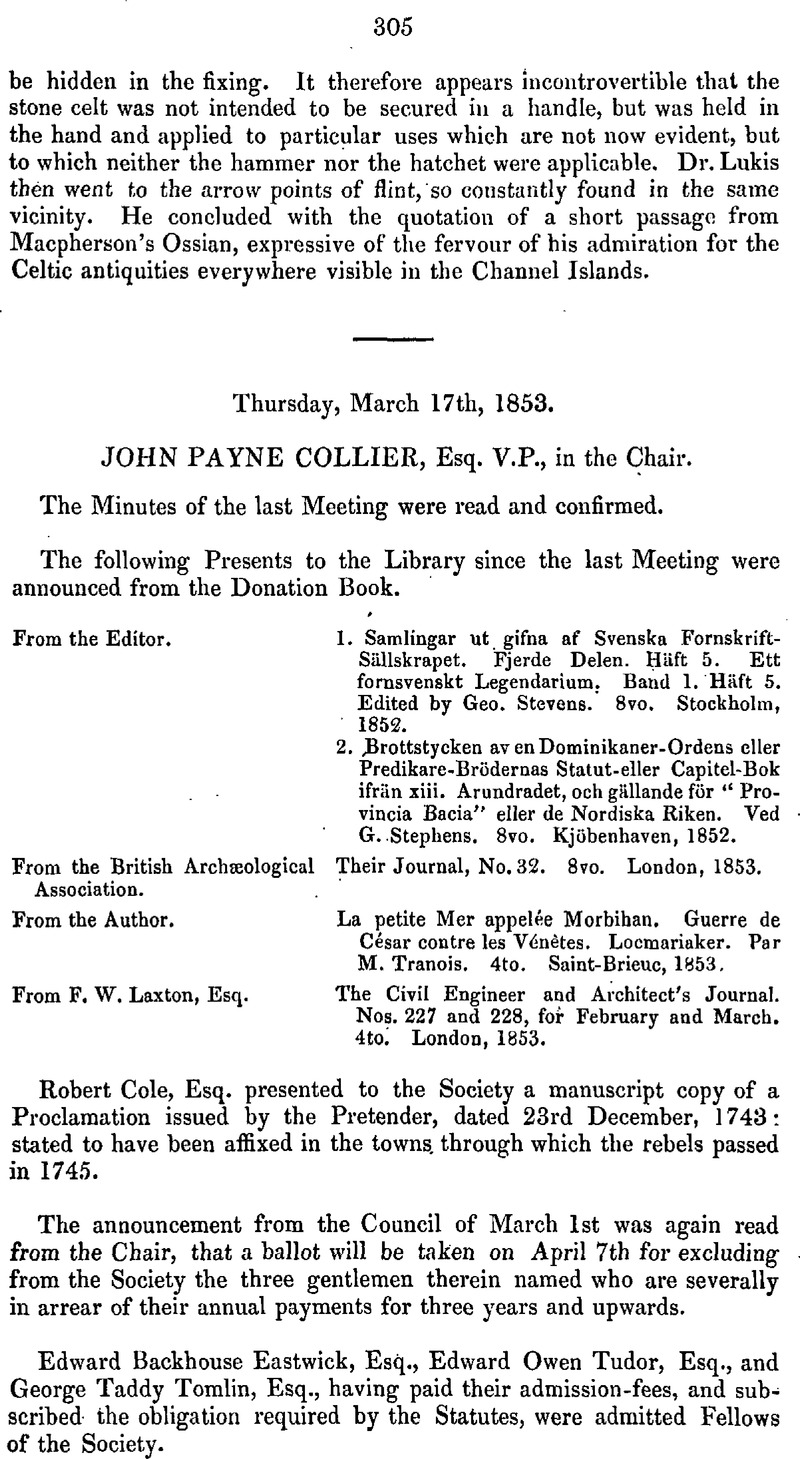No CrossRef data available.
Published online by Cambridge University Press: 10 May 2010

* “Hanc urbem fuisse illam qua; apud Antoninum rDuroliponte.… dicitur, ipsa nominis significatio probet. Sed antiquato sub Saxonibus nomine vetusto, à Gorraone Dano, cui has provineias cúm pax convenisset, Ælfredus noster concessit, Gonnoncester vocari cœpit,” &c.—Camd. Brit. ed. 1607, p. 367.
† De Gestis Regum, lib. ii. cap. 4.
‡ Note on the Fœdus Guthrum in Leges A. Sax. p. 47.
§ “Eorum rex Gudrum, quem nostri Gurmundum vocant, — in filium à rege Alfredo susceptus est. Datæ sunt ei provinceæ Orientalium Anglorum et Northanimbrorum.” —De Gestis Regtmi, lib. ii. cap. 4.
In this case Malmesbury is not in agreement with Ingulf: nor does he altogether agree with himself; for in another part of his work he reports that “Guthrum, a Danish king, reigned twelve years in East Saxonia (he means Anglia), in the time of king Alfred, leaving as his successor Eohric, also a Dane.”—Lib. i. cap. 6.
‖ Their expressions are remarkably distinct. A.D. 879:—![]() hepe … on
hepe … on ![]() A.D. 890:—
A.D. 890:—![]() he
he ![]() on
on ![]() . “In Orientali Angliâ cum suis habitavit, et provinciam illam, &c, incoluit et possedit.” “Cujus concessus maximè fuerat interOrientates Anglos.” “Estanglia, &c. ad inhabitandum donatus est.”, ‘Regnavit in Estangle,” &c.
. “In Orientali Angliâ cum suis habitavit, et provinciam illam, &c, incoluit et possedit.” “Cujus concessus maximè fuerat interOrientates Anglos.” “Estanglia, &c. ad inhabitandum donatus est.”, ‘Regnavit in Estangle,” &c.
¶ In the various accounts of Guthrum's death, he is called Se Nopðcyninʒ; rex Northmannicus; rendered by Ethelwerd “Borealium rex Anglorum.” In Ingulf we find “Estanglia, id est Northfolclda.” A confusion of these terms may possibly have produced the title of “rex Orientalium Anglorum et Northanimbroriwi, ” which is implied in the one part of Malmesbury's narrative.
* “Anglici scriptores Gormondum fere vocant. Concessusque illi, cum ibi ageret, ab Alfredo rege totus Huntingthonice tractus qui et inde Gormoncester appellitari est coeptus; attestante vetere versiculo quem citat clarissimus Camdenus,” &c.—Hist. Her. Dan. lib. v. p. 129.
† Mr. Turner, in a note on this part of the history, has the following remark in reference to the supposed identity of Gorm and Godrun. “Saxo places a Gormo Anglicus soon after Ragnar” Lodbrok. In the Chronicon of Eric he is surnamed Enske, the Englishman, and is there said to have been baptized in England. Hamsfort says he went to England and was converted by Alfred; if so, he was the Godrun here mentioned.”—A. Sax. vol. i. 8vo. p. 577.
In regard to the authority of Eric, it is probably sufficient to quote the opinion of Torfisus (Series Reg. Dan. p. 435), who, in reference to this period, says that it is hardly worth refutation: “heic uti sajpius mire in calculo confusum est.” This part of the genealogy of Saxo seems also to be fraught with difficulty; nor is any date assigned to a Gormo Anglicus clear and intelligible enough to serve an historical purpose. Were these authorities better than they are, the difference in name is still unexplained.
‡ The more usual date is 934 or 35.
§ See Laing's Snorro Sturleson, vol. i. p. 460; and Thorpe's Lappenberg, vol. ii. p. 104.
‖ Torfæeus, in a particular dissertation, cites the Historia Olafi Tryggvini as showing that the sons of Gormo Grandaivus had a prevailing interest in Northumberland.—Trifolinm Historicum, p. 15. They were Knut and Harald, “synir Gorms hins Gamla.”—Torf. Ser. Reg. Dan. p. 376.
And this appears to tally with Messenius (Chronol. Scond. torn, i.), “Anno 920. Haraldum Gormo filium in regiminis Danici admisit consortium; sed alter filiorum Canutus partem Angliæ Danis subjects administrat” It will be recollected that our Guthrum died in 890.
Gorm would also have had a brother in Northumberland, if Guthred son of Hardacnut, mentioned by Simeon of Durham, and who died in 894, was the son of Gorm's father. He also, it appears, had some sort of treaty with Alfred. ¶ “Nee prætereundum est quòd aliqui etiam è priscis illis scriptoribus hanc urbem Gumicester et Gumicastrum vocârint,” &c.—Camd. Brit. p. 367.